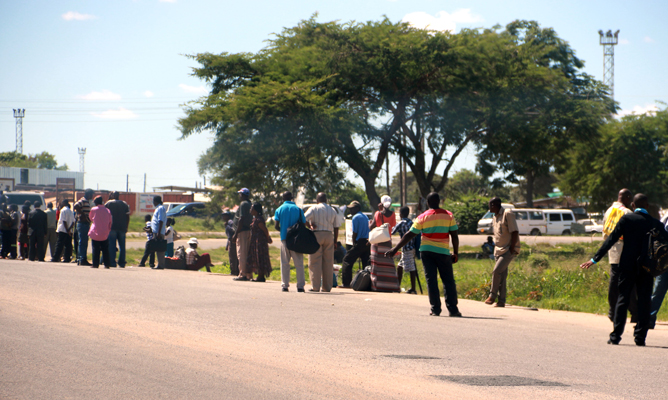
The cost of transport is fast becoming a prominent feature in the budget of an average Zimbabwean family, with the monthly cost for bus fare for those that use public transport being $44.
TATIRA ZWINOIRA
This has forced most commuters to opt for cheaper transport — open trucks that cost half as much as commuter buses.

The Consumer Council of Zimbabwe (CCZ)’s review of the average family of six’s budget for January 2016 placed it at $673,51. Of that money, it costs one adult family member an average of $44 for transport at a cost of $2 per day for a return trip to town.
In a family of six, the average number of members that use the transport system is five, meaning the cost of transport for the family would be $220.
The high transport cost has led to many people opting for private vehicles which usually charge 50c per trip — half the amount they would pay in kombis.
CCZ deputy executive director Rose Mpofu confirmed in an interview last week that most people now preferred to hitch-hike on private vehicles because they are cheaper.
“We find that people move away from public transport because the commuter omnibuses have to pay certain licences and taxes to different regulatory authorities in order to be able to operate. A private owner of a vehicle does not pay those fees so they can afford to make their transport a lot cheaper than the commuter omnibuses,” Mpofu said.
- Chamisa under fire over US$120K donation
- Mavhunga puts DeMbare into Chibuku quarterfinals
- Pension funds bet on Cabora Bassa oilfields
- Councils defy govt fire tender directive
Keep Reading
“As a result, you find consumers will begin to move from the commuter omnibuses to privately owned vehicles. Generally, transport is a major cost in most households and it is usually more than one person that needs transport on a daily basis, namely the parents plus the children and possibly other dependants.”
She said all those people would require an average of $44 per month if they were going to be using transport which usually costs $1, but if they lived closer to where they want to go, it would sometimes be half of that, bringing it down to 50 cents.
In the January review of the total family budget amounting to $673,51, $115,93 is for food, soaps and detergents $7, 65, and general living expenses $434 per month.
The second highest cost for families is school fees, where the January review showed it was an average of $50 for the cheapest day school. In a family of six, school-goers are usually three out of the four kids, which would then put the cost of school fees for the month of January at $200.
A snap survey showed that education in Harare is usually the most expensive cost to a family budget.
The slowdown of economic activity has shown that consumers are living on tight budgets due to lack of jobs, high government levies and taxes, and a severe shortage of cash.
The lack of jobs has led many to turn to the informal sector where they sell all sorts of commodities, including fruits and vegetables and run tuckshops.
Mpofu said having a national bus service system would go a long way in helping families cope with the rising costs of living.
“We should really be having a national bus service such as we used to have, but these days we just have commuter omnibuses — which are privately owned,” Mpofu said.
“Sometimes the private vehicles that the people are resorting to are very unsafe and may not have been insured for carrying passengers. We have also had unfortunate incidents where people have been kidnapped after hiking in these private vehicles,”she said.











